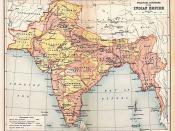The British Imperialism had a positive impact on India. When they had conquered India in 1858, India was not subjected to the influences of the western world, except for trade with the Greeks. THey ruled through the East India Company. The British did not do much for Indian Economy. In fact, taxes were raised and famine was the aftereffects of it.
In the earth 19th century, the British encouraged agriculture, which decreased nomads and pastors. The British took up a logging operation that made most of the forests treeless. Which made more room for farmers, but is bad for the environment. India was a big part of British economy. They gave Britain a balance of trade.
The British had built roads, railways, canals, irrigation, mills, and factories to further the increase in economy and transportation. They kept the level of conflicts down by supplying western law, police systems, modernized cities, and educated them by building more schools that taught western subjects.
Though the British had brought on a better economy, educated Indians began wishing for India's freedom from the grasp of the British.
The British had not tried to impose Christianity on the Indians until public
pressure forced them to in the 1830s and 1840s. Though they mostly weren't maltreated, Indians were treated as a lower class than Europeans. They were not accepted as true equals, and that soon aroused rebellions. Knowing all this, the Indian elite were still heavily influenced by European ideas and way of life, i.e. they attempted to be as European as possible.
When the British adopted India into their empire, India was ruled under the Queen. There were people sent to keep watch over the Indians. Since the British's conquering of India, Muslims and Hindus have been conflicting. Perhaps the reason for this...


